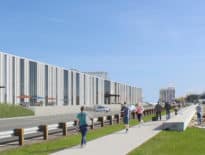State utility overseers approved a new three-year energy efficiency plan and changes to the Mass Save home energy efficiency program Tuesday, including a reduction in rebates and other incentives for buying efficient light bulbs and more of a focus on getting homeowners to switch to cheaper and more environmentally-friendly fuel sources.
The Department of Public Utilities issued an order approving the 2019-2021 statewide energy efficiency plan which sets energy savings goals and budgets for the Mass Save program offered by utility companies.
The plan for the next three years also includes active demand reduction programs intended to help control energy use during the most expensive days and hours of the year. For example, National Grid proposed a program that would allow its customers with electric vehicles to pause or shift vehicle charging during peak demand periods.
For the first time, the Mass Save program will offer incentive programs for fuel switching – specifically targeting homeowners heating with oil or propane to make the switch to a more affordable fuel and more efficient technologies like air source heat pumps.
An administration official said the previous three-year energy efficiency plan made a rebate of up to $1,200 available to a homeowner looking to install a heat pump. The new plan authorizes a rebate of up to $7,200 for an oil customer looking to switch to a heat pump. Heat pump rebates were the most popular of the state’s Clean Energy Center’s rebate offerings in the last year, the official said.
The Department of Energy Resources said the three-year plan, required under the 2008 Green Communities Act, is expected to result in the avoidance of more than 35.6 million megawatt-hours of electricity use and more than 1.19 billion therms of gas use, as well as greenhouse gas emissions that would have come with that energy use.
“Energy efficiency is the most cost-effective way to achieve environmental benefits while lowering energy costs,” Gov. Charlie Baker said in a statement.
Under the 2008 state law known as the Global Warming Solutions Act, Massachusetts is required to reduce its emissions to 25 percent below 1990 levels by 2020 and 80 percent below 1990 levels by 2050.
DOER Commissioner Judith Judson said the new plan “goes even further in enabling residents and businesses to have energy efficiency than we have ever done previously” and establishes “the highest gas savings goal that we have ever had.” The plan projects a 2.67 percent reduction in total electricity sales over three years and a 1.25 percent reduction in natural gas sales over the same amount of time.
DPU noted in its order that DOER “recognizes that much of the ‘low-hanging fruit’ in energy efficiency has been captured over the past decade and concludes that the proposed savings goals will achieve all cost-effective energy efficiency at a cost that is significantly less than the avoided cost of supply.”




 |
| 


